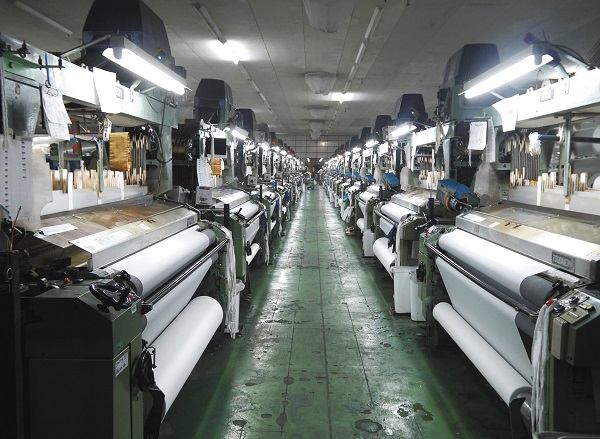The Hokuriku region leads the world in the production of synthetic textiles. The combination of the unique yarn produced by the synthetic fibre manufacturers and the next-generation production technology of the companies in the area develops textiles at the top level. There may be competition from products from abroad, but in the global market, where high value is demanded of apparel, the importance of Hokuriku fabrics continues to grow.
Revealing company secrets
The three prefectures of Fukui, Ishikawa and Toyama in Hokuriku have seen an accumulation of many textile industries throughout history, beginning with silk. The expansion of the synthetic fibre production industry due to economic development in the post-war period has brought changes to Japan’s leading synthetic textile production areas.
Furthermore, the development of yarn by domestic synthetic fibre manufacturers has boosted the development of textiles overall, leading to the advancement of processing throughout the supply chain. This includes yarn processing, weaving, knitting and dyeing, with an accumulation of world-leading technical ability.
In recent years, synthetic fibre manufacturers have seen a number of drastic environmental changes, including structural reform and the arrival of products from abroad. Now, new efforts are aimed at further advancements in the region, so as to defy these boundaries in the future.
In 2014, Daiichi Orimono, Kaji Group Co., Ltd and Toyoshima Seni Co., Ltd., who specialize in lightweight, high-density fabrics, established the project Horizontal Co-op to pursue development and sales jointly. The aim is to disclose their know-how, which had been company secrets, with one another, to bring about revolutionary product development.
They share the sense of risk that “one cannot survive as a weaver alone,” and with the aim of producing unique yarn through collaboration in processing and dyeing in the production area, they will develop one-of-a-kind raw materials. An example is the development of chambray using 20 denier pre-dyed nylon, under the joint brand Cube Tex.
In Fukui, ITOMO, a group of younger-generation workers from various fields of the industry, has vitalised its activities. ITOMO started out as a group that held workshops and tours on other production areas, but last year, it began engaging in business activities, including the launch of a collaborative project with Takisada Nagoya Co., Ltd., called Hokusai.
Yarn manufacturers are also hoping to differentiate themselves in terms of thread, by working together. Last year saw joint thread development with Mitsubishi Rayon on polyester, with Asahi Kasei Advance Corporation on cupra. This year it started pursuing functional polyester with Teijin Frontier Co., Ltd.

